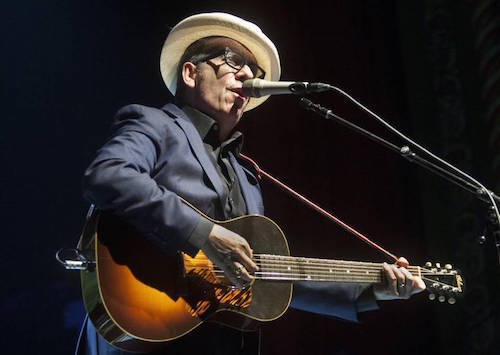
10.10.2016
AT YARDLEY HALL, ELVIS COSTELLO PROVES HE’S ONE OF THE MOST PROLIFIC SONGWRITERS
The Kansas City Star: Timothy Finn: October 8th 2016
He has been considered one of the best and most prolific songwriters of the past 50 years, and Friday night inside Yardley Hall on the campus of Johnson County Community College, Elvis Costello proved why.
For more than two hours, Costello took a crowd of more than 1,000 on a warm journey through a catalog that goes back to the mid-1970s and taps into an array of genres.
Like Ray Davies’ fabled “Storytellers” tour, this was a one-man show that revisited Costello’s childhood and included tales and images of the people and places who inspired and influenced him, including footage of his bandleader father, Ross McManus, performing “If I Had a Hammer” at a 1963 Royal Command Performance.
As it was for his show at the Uptown Theater in March 2015, the stage was set with a large ’60s-style television set/video screen flanked by a “Detour” and “On Air” signs. The stage was also set with a large megaphone, which he uses as a prop a couple of times.
From a piano or acoustic guitar, Costello delivered a set list that mined some of his lesser-known work, plus several songs he wrote for the musical “A Face in the Crowd,” which is expected to premiere in 2017. On one of those songs, the smoldering ballad “Burn the Paper Down to Ash,” Costello turned lead vocal duties over to Rebecca Lovell, one-half of the sisterly roots/rock duo Larkin Poe, the evening’s openers. Throughout the show, she, on mandolin, and her sister, Megan Lovell, on dobro, gave Costello vocal and instrumental backup, as they did on another “Face” song, “Vitajex,” a mock commercial for pep pills that featured Costello on ukelele.
The sisters embellished reworkings of several tracks, including “That’s Not the Part of Him You’re Leaving,” a lovely, melancholy ballad — “a cautionary tale,” he said — about a couple at a crossroads: His interests are more about the flesh, hers about the heart.
Costello recast many of his songs, stripping them bare and applying new wardrobes and cosmetics but without disfiguring or camouflaging them. Each further revealed his trademark clever and thoughtful chord progressions and melodies and accentuated his incisive lyrics, which assiduously avoid predictability and cliché.
“Every Day I Write the Book” was flipped from its buoyant pop sensibility into a darker folk-ish ballad. They turned “(The Angels Wanna Wear My) Red Shoes” into a ’60s-ish pop-folk tune, one with a mild Everly Brothers flavor.
As the TV screen behind him flashed images of pulp-crime-film posters, including “Kansas City Confidential,” Costello delivered an electrified version of “Watching the Detectives” that was more urgent and frenzied than the original.
He followed that with one of his classics, “Alison,” which he performed unamplified, strolling through the crowd, eventually taking perch in an empty seat, strumming an acoustic guitar and singing as if he were on a porch swing, serenading the neighborhood.
Other highlights: His cover of the Walter Donaldson nugget “Little White Lies”; “Brilliant Mistake” from the classic “King of America”; “Down on the Bottom,” one of Costello’s contributions to the “New Basement Tapes” compilation; and “American Without Tears,” featuring Costello on blues harp, which gave the song a Dylan-ish vibe.
Costello’s voice is elemental to his music, another inimitable trait. It remains strong and full of character, though these days its cracks and warps are a bit deeper and warp-ier. His instrumental prowess was on display as well, whether issuing commanding rhythms and leads on one of his many guitars or percussive blues or jazz rhythms and fills at the piano.
His encore included a demonstrative version of “(What’s So Funny ‘Bout) Peace, Love & Understanding,” a rabble-rousing anthem that has resonated for more than 30 years but never more resoundingly than it does these days.
He followed that with a couple more songs, including his version of the country classic “Good Year for the Roses,” a track from “Almost Blue,” his tribute to classic country.
By the time he’d ended and taken a bow, Costello had been on stage for nearly 140 minutes, but the crowd appealed loudly for more. He looked like he was considering it before he waved his final farewell. Lord knows he had enough good material to go on all night.